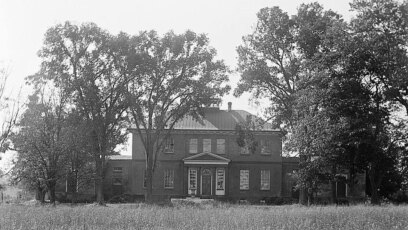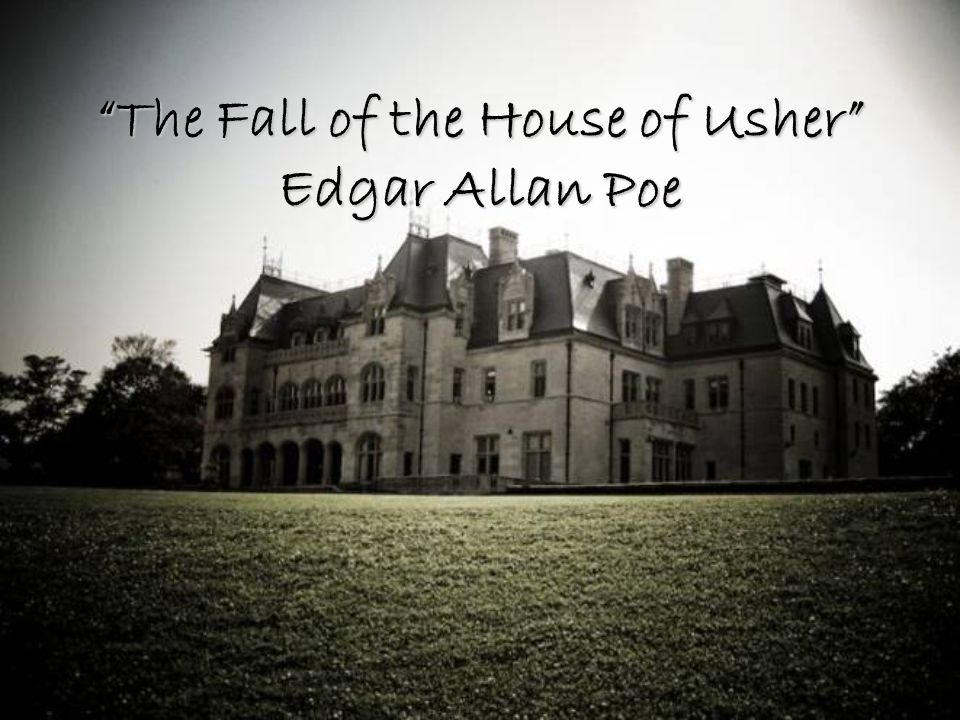We present the last of three parts of the short story “The Fall of the House of Usher,” by Edgar Allan Poe. The story was originally adapted and recorded by the U.S. Department of State.
I was visiting an old friend of mine, Roderick Usher, in his old stone house, his palace, where a feeling of death hung on the air. I saw how fear was pressing on his heart and mind. Now his only sister, the lady Madeline, had died and we had put her body in its resting place, in a room inside the cold walls of the palace, a damp, dark vault, a fearful place. As we looked down upon her face, I saw that there was a strong likeness between the two. “Indeed,” said Usher, “we were born on the same day, and the tie between us has always been strong.”
We did not long look down at her, for fear and wonder filled our hearts. There was still a little color in her face and there seemed to be a smile on her lips. We closed the heavy iron door and returned to the rooms above, which were hardly less gloomy than the vault.
And now a change came in the sickness of my friend’s mind. He went from room to room with a hurried step. His face was, if possible, whiter and more ghastly than before, and the light in his eyes had gone. The trembling in his voice seemed to show the greatest fear. At times he sat looking at nothing for hours, as if listening to some sound I could not hear. I felt his condition, slowly but certainly, gaining power over me; I felt that his wild ideas were becoming fixed in my own mind.
As I was going to bed late in the night of the seventh or eighth day after we placed the lady Madeline within the vault, I experienced the full power of such feelings. Sleep did not come — while the hours passed. My mind fought against the nervousness. I tried to believe that much, if not all, of what I felt was due to the gloomy room, to the dark wall coverings, which in a rising wind moved on the walls. But my efforts were useless. A trembling I could not stop filled my body, and fear without reason caught my heart. I sat up, looking into the darkness of my room, listening — I do not know why — to certain low sounds which came when the storm was quiet. A feeling of horror lay upon me like a heavy weight. I put on my clothes and began walking nervously around the room.
I had been walking for a very short time when I heard a light step coming toward my door. I knew it was Usher. In a moment I saw him at my door, as usual very white, but there was a wild laugh in his eyes. Even so, I was glad to have his company. “And have you not seen it?” he said. He hurried to one of the windows and opened it to the storm.
The force of the entering wind nearly lifted us from our feet. It was, indeed, a stormy but beautiful night, and wildly strange. The heavy, low-hanging clouds which seemed to press down upon the house, flew from all directions against each other, always returning and never passing away in the distance. With their great thickness they cut off all light from the moon and the stars. But we could see them because they were lighted from below by the air itself, which we could see, rising from the dark lake and from the stones of the house itself.
“You must not — you shall not look out at this!” I said to Usher, as I led him from the window to a seat. “This appearance which surprises you so has been seen in other places, too. Perhaps the lake is the cause. Let us close this window; the air is cold. Here is one of the stories you like best. I will read and you shall listen and thus we will live through this fearful night together.”
The old book which I had picked up was one written by a fool for fools to read, and it was not, in truth, one that Usher liked. It was, however, the only one within easy reach. He seemed to listen quietly. Then I came to a part of the story in which a man, a strong man full of wine, begins to break down a door, and the sound of the dry wood as it breaks can be heard through all the forest around him.
Here I stopped, for it seemed to me that from some very distant part of the house sounds came to my ears like those of which I had been reading. It must have been this likeness that had made me notice them, for the sounds themselves, with the storm still increasing, were nothing to stop or interest me.
I continued the story, and read how the man, now entering through the broken door, discovers a strange and terrible animal of the kind so often found in these old stories. He strikes it and it falls, with such a cry that he has to close his ears with his hands. Here again I stopped.
There could be no doubt. This time I did hear a distant sound, very much like the cry of the animal in the story. I tried to control myself so that my friend would see nothing of what I felt. I was not certain that he had heard the sound, although he had clearly changed in some way. He had slowly moved his chair so that I could not see him well. I did see that his lips were moving as if he were speaking to himself. His head had dropped forward, but I knew he was not asleep, for his eyes were open and he was moving his body from side to side.
I began reading again, and quickly came to a part of the story where a heavy piece of iron falls on a stone floor with a ringing sound. These words had just passed my lips when I heard clearly, but from far away, a loud ringing sound — as if something of iron had indeed fallen heavily upon a stone floor, or as if an iron door had closed.
I lost control of myself completely, and jumped up from my chair. Usher still sat, moving a little from side to side. His eyes were turned to the floor. I rushed to his chair. As I placed my hand on his shoulder, I felt that his whole body was trembling; a sickly smile touched his lips; he spoke in a low, quick, and nervous voice as if he did not know I was there.
“Yes!” he said. “I heard it! Many minutes, many hours, many days have I heard it — but I did not dare to speak! We have put her living in the vault! Did I not say that my senses were too strong? I heard her first movements many days ago — yet I did not dare to speak! And now, that story — but the sounds were hers! Oh, where shall I run?! She is coming — coming to ask why I put her there too soon. I hear her footsteps on the stairs. I hear the heavy beating of her heart.” Here he jumped up and cried as if he were giving up his soul: “I tell you, she now stands at the door!!”
The great door to which he was pointing now slowly opened. It was the work of the rushing wind, perhaps — but no — outside that door a shape did stand, the tall figure, in its grave-clothes, of the lady Madeline of Usher. There was blood upon her white dress, and the signs of her terrible efforts to escape were upon every part of her thin form. For a moment she remained trembling at the door; then, with a low cry, she fell heavily in upon her brother; in her pain, as she died at last, she carried him down with her, down to the floor. He too was dead, killed by his own fear.
I rushed from the room; I rushed from the house. I ran. The storm was around me in all its strength as I crossed the bridge. Suddenly a wild light moved along the ground at my feet, and I turned to see where it could have come from, for only the great house and its darkness were behind me. The light was that of the full moon, of a bloodred moon, which was now shining through that break in the front wall, that crack which I thought I had seen when I first saw the palace. Then only a little crack, it now widened as I watched. A strong wind came rushing over me — the whole face of the moon appeared. I saw the great walls falling apart. There was a long and stormy shouting sound — and the deep black lake closed darkly over all that remained of the House of Usher.
Now it’s your turn to use the words in this story. How do you act in scary situations? How do you in act in very sad situations? Let us know in the comments section or on
Quiz – The Fall of the House of Usher, Part Three

Start the Quiz to find out
_______________________________________________________________
Words in This Story
palace – n. the official home of a king, queen, president, or other official
vault – n. a locked room where money or valuable things are kept
likeness – n. the quality or state of being alike or similar especially in appearance
ghastly – adj. very shocking or horrible
trembling – v. shaking slightly because you are afraid, nervous, or excited
certain – adj. used to refer to a quality that is noticed but that is difficult to explain or describe
horror – n. a very strong feeling of fear, dread, and shock
doubt – n. a feeling of being unsure about something
rush – v. to move or do something very quickly or in a way that shows you are in a hurry
figure – n. a person or animal that can be seen only as a shape or outline
grave – n. a hole in the ground for burying a dead body
